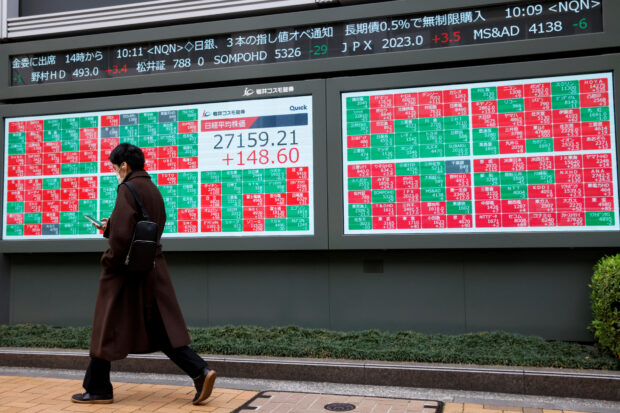
A man walks past an electronic board showing Japan’s Nikkei average and stock prices outside a brokerage, in Tokyo, Japan, March 17, 2023. REUTERS/Androniki Christodoulou/File photo
SINGAPORE – Asian stocks steadied and U.S futures rose on Monday in relief at a weekend rescue deal for Credit Suisse and a concerted effort from central banks to shore up the mood, though trade was tense and volatile as contagion fears stalked financial shares.
S&P 500 futures rose 0.7 percent in bumpy trade and bonds fell as investors reckoned less immediate fears of financial instability reduced the likelihood of rate cuts later this year.
Beaten-down bank shares bounced 1 percent in Tokyo, while the broader Nikkei fell 0.2 percent. Financials in Australia fell 0.8 percent and the ASX 200 fell 0.5 percent.
In a little over a week, the fallout from the collapse of Silicon Valley Bank – which has roiled confidence in the banking system – has brought a globally systemic lender to its knees.
Over the weekend, UBS said it will buy Credit Suisse for 3 billion francs ($3.2 billion) and assume up to $5.4 billion in losses, in a shotgun merger engineered by Swiss authorities.
Central banks try to calm markets after UBS deal to buy Credit Suisse
Central banks including the Fed, the European Central Bank and Bank of Japan pledged to deepen support for liquidity, by increasing the frequency of seven-day dollar-swap operations from weekly to daily.
“The best we can say was there are certainly a lot of concerns about Credit Suisse contagion risk,” said Rodrigo Catril, a senior currency strategist at National Australia Bank in Sydney.
“The news overnight from Switzerland has helped,” he said, though added that the central bank moves had also drawn attention to how deep troubles may run.
“It’s the irony of good news reflecting how bad things are. It’s great we’re seeing this concerted effort from central banks, and it’s positive, but it does also highlight how troubling the circumstances are and how worried central banks appear to be as well.”
The Asia day offered an encouraging start, with Japanese yen cross-currency swaps, a measure of non-U.S. investor demand for dollars, shrinking to minus 35 basis points or half their levels last week, in another sign of respite in market funding conditions.
Still, at least two major banks in Europe are examining scenarios of contagion in the region’s banking sector and are looking to the Fed and the ECB for stronger signals of support, two senior executives close to the discussions told Reuters.
S&P cuts First Republic deeper into junk, says $30-B infusion may not solve problems
Concern remains elevated, too, about regional banks in the United States. On Sunday First Republic had its credit rating pushed deeper into junk status by S&P Global and elsewhere efforts to raise capital are hitting difficulties.
U.S. 10-year Treasury yields rose 9 bps to 3.49 percent in Asia and 2-year yields rose 13 bps to 3.973 percent.
Interest rate futures pricing implies about a 60- percent chance that the Fed hikes rates at its meeting later in the week, but has also priced in several rate cuts by the end of the year.
In foreign exchange trade, the dollar was a little bit softer on most majors. The euro rose 0.1 percent to $1.0682. The safe-haven yen eased slightly to 132.39 per dollar.